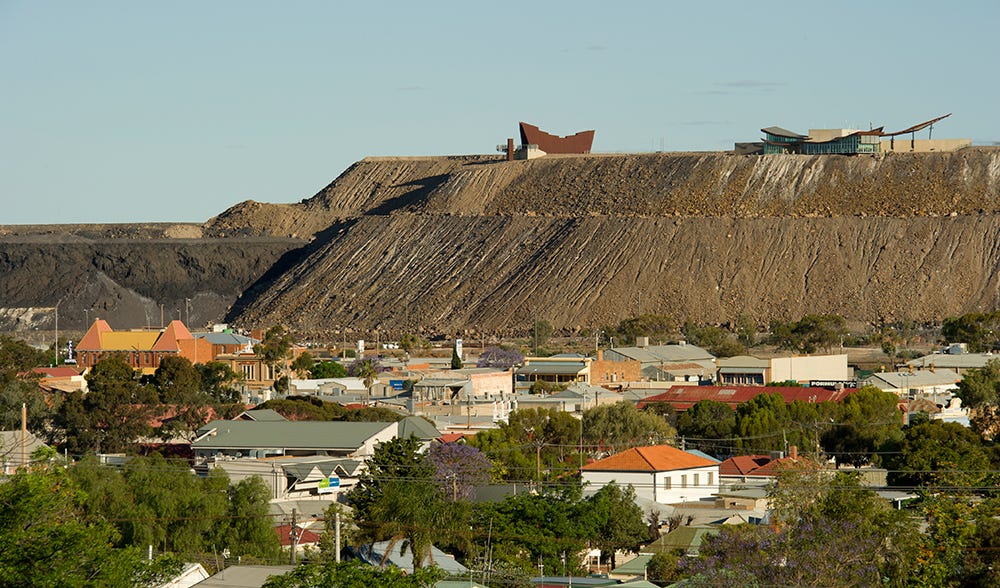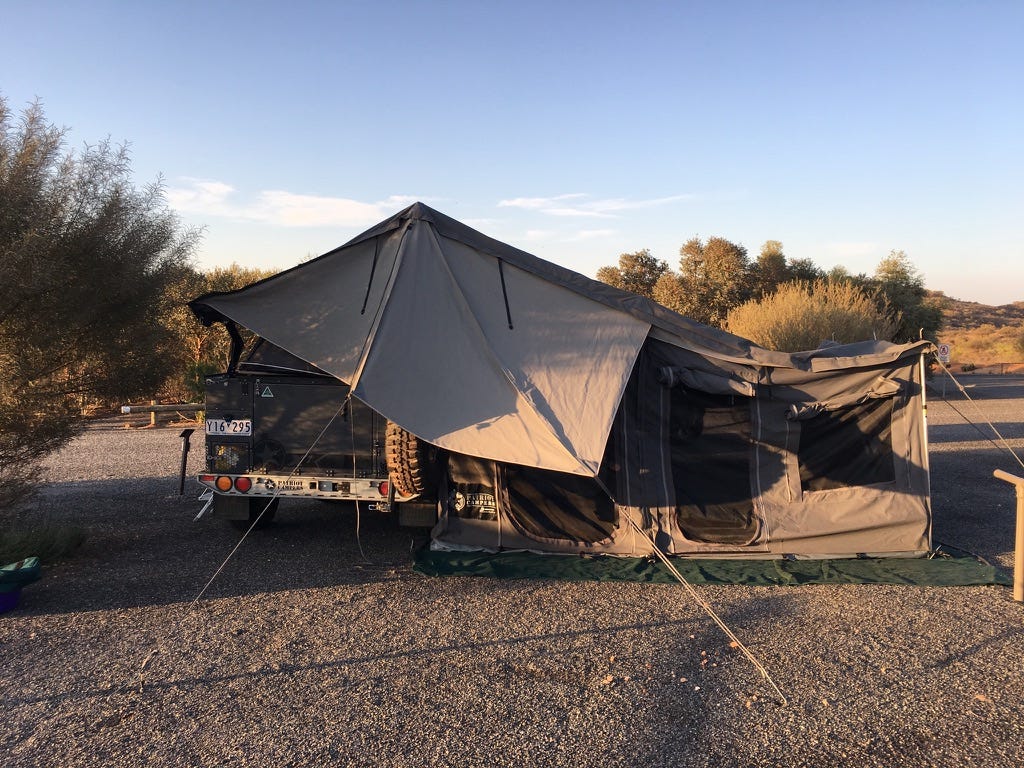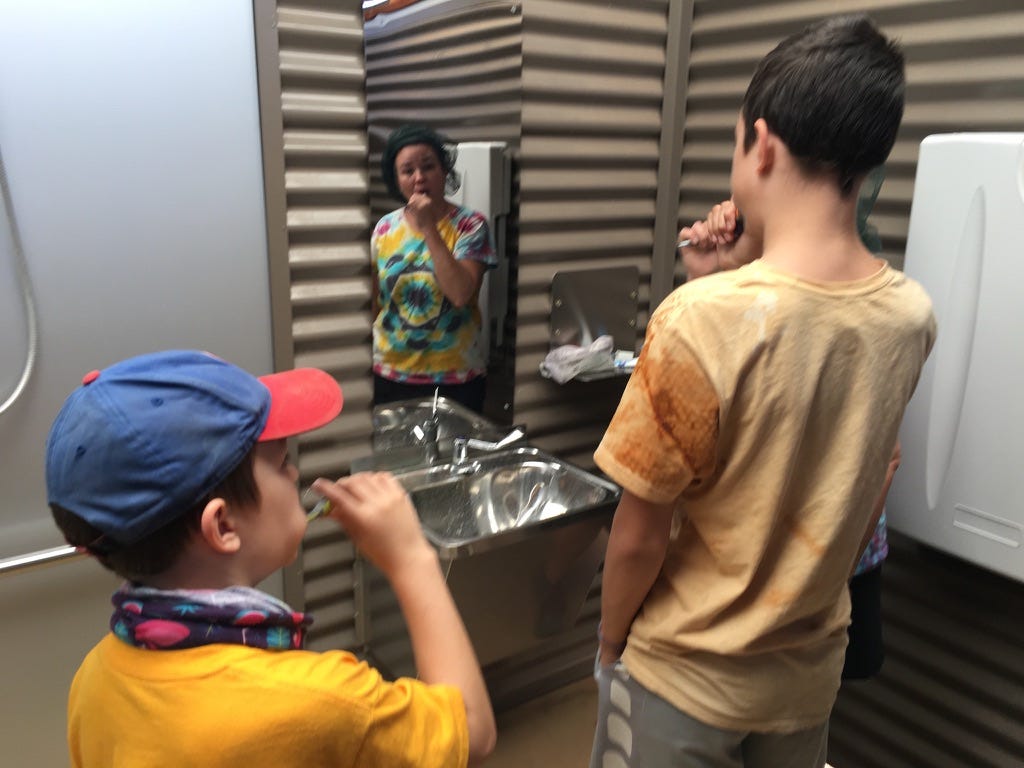G’day once again!
Welcome to letter number 4, and we’ve made it all the way to Broken Hill, a rocky old mining town in the middle of nowhere New South Wales. It hardly seems right that both the scenic dirt piles of Broken Hill and idyllic Sydney are located in the same state, but thus are the wonders of Australia.
For those of you for whom this is your first letter, welcome! Good on ya for signing up. Letters From the Road is the story of a family road trip in Australia, told one weekly installment at a time using my journal entries written during the trip. You’ll probably figure this out, but I thought I may as well mention that the quoted bits are the journal entry, and the rest is me filling in the gaps.
And if you’ve just joined us, you’re not that far behind - the first three letters can be found here under a mullock heap* in the boot of the car.
This letter also comes with some news: I’m working on a cool new addition to Letters From the Road with my super genius artist brother Nick, something that should be coming very soon.
Let’s get to your letter!
*waste material from a mine, or the central feature of downtown Broken Hill

4th October 2019, Broken Hill, NSW
I awoke at 7 am on the day we were leaving for Broken Hill, and after 9 hours of sleep, I still feel beat up. There’s a pressure in my head like I’ve got a hangover, but no drinking was done last night. I exited the tent and started making coffee, and Henry followed a few moments later. He was fully clothed in long pants, socks with his thongs (wearing socks with thongs is incorrect, I’ve told him, but he doesn’t listen) and a hooded sweatshirt pulled up over his head.“Why does it have to be so cold!” He complained. Just you wait, son, until we’re in the middle of the desert and you can’t sleep because you’re sweating in your bed. Just you wait.
Our neighbor stopped by as we were packing up in Mildura, and told us to enjoy the time we have, while we have it. And he meant it. He was on his third marriage after losing his first two wives to cancer. One grandson lost to leukemia and another just diagnosed. I cannot imagine all that loss afflicting one guy, but here he was. As if we needed a reminder about our reasons for doing this trip, this really hit home, his words coming with a tone that was a sort of sad acknowledgment of sickness that kept coming.
He wished us all the best then went off to feed the ducks, saying ‘I can’t believe I’m feeding these guys, I used to shoot ‘em!’
I had been buoyed by encounters like this one throughout the year we’d been traveling.
In May, and before returning to Australia, we had camped at Greenbelt National Park in Maryland, just outside Washington, D.C. It was a wonderful campground, with sites carved into the green woods that had a canopy so thick that the ground wasn’t often touched by sunshine. A gent named Steve was camped a short walk down the road from where we pitched our tent. He looked to be somewhere in the neighbourhood of retirement age, and was camping by himself in his van. He had spotted us blundering around in the back of our car, and stopped by to see if we needed assistance.
Before getting to where I am heading with Steve, a short aside about refrigerators. Our camping setup when we roadtripped in the U.S. was markedly different from the burly setup we were using in Australia. Heading for the Outback, we were driving our rough-and-ready late-model Toyota Prado. 4wd, angry tyres, diesel only. Pulled behind us was a complicated camper trailer that had its own power and a water tank and a fire extinguisher, amongst other things. Let’s just say that Russell Bates, Melbourne’s foremost expert on four-wheel drive camping (in my eyes) and quite possibly the Sheriff in town, the man who helped us to get set up for our trip, approved of the setup. I introduced Russell in the second Letter From the Road. You should check that out - he’s a champion character.
In the U.S., we drove a Toyota Highlander with leather seats, a reasonable sound system, and windshield wipers that worked a treat. Basically a medium sized, comfortable car. We used it to haul around a giant orange tent that we’d set up every night and take down every morning, and bins and bags full of every kind of gear imaginable.
Our sole piece of smart camping technology was a portable electric refrigerator. If you don’t have or have never used one of these beauties, I would encourage you to do so immediately, even if you have no plans to drive mass kilometres or sleep under the stars for months at a time. Not having to constantly replenish bags of ice or devise contraptions in your esky - a cooler, to Australians - to keep your charcuterie from floating around in melted ice water, will change your life.
Portable fridges have one obvious drawback: they need power. All the time. Normally you can hook them up to your car, and the running engine will easily keep the fridge and your kombucha cold. However, you’ve probably already spotted the problem: the car’s not running all of the time. I also identified this as an issue, and so hacked up a solution using a car battery and some jumper cables. The general idea was that when the car wasn’t running, we’d hook the refrigerator up to the spare battery and tell the boys to stay away from it except when another beer was needed and Katie and I were in repose.
On our first day at Greenbelt Park, Steve was wandering by and noticed me hefting around my car battery, cables and the like, and he thought we might need help.
‘I used to be an electrical engineer,’ he told us. I was skeptical, but he did wear glasses that looked like something Steve Wozniak would have sported back in 1982, so I did not dismiss him entirely. Once he started throwing around AC/DC and capacitors and the like, however, I knew that he was for real and milked him for all the information he was worth. In addition to getting some tips on improving our refrigerator setup, we got a bit of Steve’s story. He’d been diagnosed with cancer not too long prior, a rather ugly form if I remember correctly. He said the news was a shock to him and his wife, but instead of wallowing, he used the news as motivation. He built his own little solo campervan, with an electrical system that would make even Russell Bates envious, and set off on the road. It was always something that he’d wanted to do, and the cancer was the push that he needed.
What struck me about Steve was that he didn’t lament his cancer. It was just something he had to deal with, like replacing an old car that finally gave up. It sucked, but you’ve just got to get on with it. Not only that, but he’d used the news to course correct, and make sure he was using his precious time on the life he wanted to lead. For Steve, that was hitting the road, seeing parts of the country he’d always wanted to see, and spending time with his loved ones.
Enjoy the time you have, while you have it, our friend at the caravan park in Mildura told us before joining the ducks for lunch.
There was a point two years prior to our trip when I probably found myself saying something similar to Katie, in trying to convince her that it was a good idea to take a year off and go traveling.
You might get hit by a bus tomorrow, people say. Carpe diem! Life is short, all that. Trite, ordinary words, made tasteless by overuse, like when you eat an entire bag of salt and vinegar chips and by the end your tongue is numb and you’re sad.
But there might be a sliver of something to them. Two years back, I’d thought a lot about enjoying the time I have, because I was stuck in a rut. 2017 marked 18 years into my working life - 18 years since starting my first job as a golf course construction estimator - a dirt counter, according to my friends. I was a dewy Iowa boy, fresh out of college, fresh off the Interstate in south Florida, and working for a company that built golf courses designed by the likes of Jack Nicklaus and Greg Norman. One night, a couple months into the job, I came home late from work, exhausted. It’d not been the first time I had put in long hours. I had a tired dinner with my then-girlfriend Katie, before going straight to bed. We both laid there in the dark talking, and I remember saying to her ‘it’s not going to always be like this, is it?’
18 years later, surely I would have figured things out by then. I would have either found some work I love, something where staying late would be just perfectly acceptable. Either that or I would have been worn smooth over time and come to accept work as this necessary thing and it wasn’t worth fighting for foofy principles like fulfillment and purpose. I might never love my job, but you’ve got to pay the bills and not being able to would probably be worse than being unfulfilled. Besides, by all accounts I’d had good jobs with good companies and had been treated well.
And yet, 18 years later and I still felt clueless. So I wandered into the Carpe Diem camp, and had convinced myself of its mantras enough to want to serve up small doses of the kool-aid to Katie while dropping hints about all the glory that a year long road trip could bring.
But it wasn’t until I started having conversations with guys like Steve, our duck-loving neighbour at the caravan park, and others during our trip, that I really got the point of it all. Why does it matter that we seize the day? It matters because you might lose two wives and two grandchildren somewhere along the way. It matters because of people like our friend Laurel, who had her life turned upside down by breast cancer. And while she’d fought it and beat it down like a champion, it could just have easily gone the other way.
All of which is a long way of saying that whenever things got tough during our trip, and another night sleeping in the dust on the side of the road seemed impossible, there always seemed to be a stranger or a friend there to give us a push.
The sand turned gray for a moment, a change from the reddish brown that appeared after leaving Wentworth, a town just outside Mildura, and shortly thereafter we arrived at the Coombah Roadhouse. It was closed, the bowsers all in pieces and parking lot roped off with blue tape.
So we pulled off on the side of the road next to a Telstra payphone. A woman with hair the colour of the sand came out of the roadhouse and started calling, ‘do you need a funnel?’
No, we’re fine, we assured her, unsure what we’d do with a funnel anyways. She then proceeded to lecture a guy who had parked his station wagon behind us, about taking some bones off the side of the road.
‘You were trespassing and you were stealing,’ she told him, in the nicest way possible. After he put his tail between his legs and went back across the road to return the bones to where he found them, she turned again to us.
For good measure she was wearing her Coombah Roadhouse collared shirt, even though the roadhouse was clearly closed.
‘New bowsers were supposed to be here Wednesday,’ she said. ‘Can’t even let anyone drive in because they said the static electricity is dangerous.’
She saw we were making peanut butter and jelly sandwiches at the side of the trailer.
‘Ah, you’re making those bloody peanut butter sandwiches,’ she sneered with disdain, then went on to tell us about some people who visited her from Idaho, ‘and I don’t need to explain to you about people from Idaho,’ she said with a nudge that said we surely understood the trouble with Idahoans. Those silly Idahoans smeared vegemite all over their bread like peanut butter, she told us aghast. ‘They didn’t understand how to eat it properly.’ We then went on to have a discussion about how vegemite is best on toast, with butter, and in moderation. We were mates now.
‘So have you had a proper peanut butter sandwich?’ I asked her.
‘This one time I ate a nut mix that had peanuts, I was all like...’ and she proceeded to make a choking noise and a face that looked like she was vomiting. She smiled, showing a mouth that was unfortunately missing a few teeth. Peanut butter sandwiches would suit her, I thought. They’re very soft and chewy, no need for teeth really.
‘Remember back in the 90’s when everything was satay?’ She said, switching gears slightly.
‘Oh sure,’ Katie agreed.
‘Everyone was making satay, and I could barely walk down the street without...’ and she made the vomit face again.
Next to the roadhouse exit sat a giant goat made of metal bars. After the woman spent a moment ridiculing it, then wondering out loud whether epoxy paint or fibreglass would be a better finish, Katie and I excused ourselves in case she felt like chatting all afternoon. I had already finished my sandwich, we had stayed there so long.
We got to Broken Hill after driving through the nothingness after Wentworth. Two things were clear: it’s hot here - 35 degrees (95 F) - and that they are fond of large piles of rocks, which could be seen everywhere around town. Huge piles, large hills really, leftover from mining days. It gives the Broken Hill a really desolate, industrial feel.
We stopped in at the tourist information place, found a bottle shop called the Sip n’ Save, which actually had a few reasonable beers, and then headed 10 mins north of town to the Starview Primitive Campground.
I was not excited to be out in the bush where there’s no shade when the weather is 35 degrees and cloudless. Katie didn’t appreciate me saying so. We pulled in with only a bit of jockeying of the trailer, and hopped out to set up. Henry exited the car quickly, saying to me ‘how can I help?’ I grabbed him in a big hug and said he’d just made my day, and he had. It made the hour of setup - pounding stakes into asphalt while getting swarmed by flies - a little bit better.
One hour setup, family tent looks like it’s about to cave in, but we’ll survive for one night.
The Family Tent
Peg far cornersInstall first corner pole, don’t peg
Guy first corner (in two spots?)
Pole second corner
Guy
Pole middle
Guy
Adjust pole position, height, then peg
A long road trip is full of new routines, especially when you are camping every night. This is especially true when you are using a camper trailer that made every night and every morning an exercise in futility.
Take setting up The Family Tent as but one small example. The Family Tent was an extension to our regular tent that provided a much larger area for the boys to sleep. It required approximately 45 minutes of your afternoon, 6 different poles and guy lines, and working with a zip attachment from inside the main tent, installation of which was reminiscent of wrestling a blanket in a dark oven. At the end you’d be left with something looking like it’d topple over if the one of the boys farted.
We had no clue how to install it, and based on the results in Broken Hill, I am not sure why I felt inspired to write them down. I was possibly attempting to make sense of something on our camper trailer, as there were no instructions for any of it and none of it made sense, aside from the refrigerator.
Luckily, the stars at the Starview were indeed worth the effort, and the bathroom far from primitive, despite the name.
And luckily we’d not not be wanting for practice setting up our tent. The next day we’d be off again, to Wilpena Pound in South Australia.





